雅思G类大作文真题范文:住在大城市公寓的利弊 2018-01-05: India
G类5.5分作文及范文 关于apartment
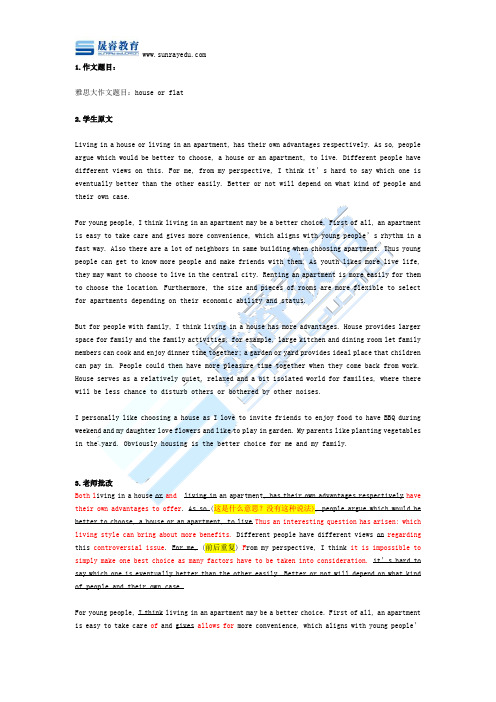
1.作文题目:雅思大作文题目:house or flat2.学生原文Living in a house or living in an apartment, has their own advantages respectively. As so, people argue which would be better to choose, a house or an apartment, to live. Different people have different views on this. For me, from my perspective, I think it’s hard to say which one is eventually better than the other easily. Better or not will depend on what kind of people and their own case.For young people, I think living in an apartment may be a better choice. First of all, an apartment is easy to take care and gives more convenience, which aligns with young people’s rhythm in a fast way. Also there are a lot of neighbors in same building when choosing apartment. Thus young people can get to know more people and make friends with them. As youth likes more live life, they may want to choose to live in the central city. Renting an apartment is more easily for them to choose the location. Furthermore, the size and pieces of rooms are more flexible to select for apartments depending on their economic ability and status.But for people with family, I think living in a house has more advantages. House provides larger space for family and the family activities, for example, large kitchen and dining room let family members can cook and enjoy dinner time together; a garden or yard provides ideal place that children can pay in. People could then have more pleasure time together when they come back from work. House serves as a relatively quiet, relaxed and a bit isolated world for families, where there will be less chance to disturb others or bothered by other noises.I personally like choosing a house as I love to invite friends to enjoy food to have BBQ during weekend and my daughter love flowers and like to play in garden. My parents like planting vegetables in the yard. Obviously housing is the better choice for me and my family.3.老师批改Both l iving in a house or and living in an apartment, has their own advantages respectively have their own advantages to offer. As so(better to choose, a house or an apartment, to live Thus an interesting question has arisen: which living style can bring about more benefits.Different people have different views on regarding this controversial issue. For me,(前后重复) F rom my perspective, I think it is impossible to simply make one best choice as many factors have to be taken into consideration.it’s hard to say which one is eventually better than the other easily. Better or not will depend on what kind of people and their own case.For young people, I think living in an apartment may be a better choice. First of all, an apartment is easy to take care of and gives allows for more convenience, which aligns with young people’srhythm in a fast way relatively fast pace of life. Also, there are a lot of neighbors in the same building when choosing apartment. Thus young people can get are more likely and have easier access to know more people and make friends with them. As youth likes more live life, they may want to choose to live in the central area of the city. Renting an apartment is more easily easier for them to choose the location (更容易让他们选择地点?什么意思?). Furthermore, the size and pieces of rooms are more flexible to select more choices of rooms are available regardless of sizes or decorations for apartments and therefore people can make choices depending on their economic financial ability and status other preferences.But for people with family, I think the advantages of living in a house has more advantages outweigh its disadvantages. House provides larger space for family and the family activities, for example, large kitchen and dining room let family members can cook(这句话里有2个谓语 let和cook,没有哪句话有2个谓语的。
讨论住在大城市的优点和缺点英语作文
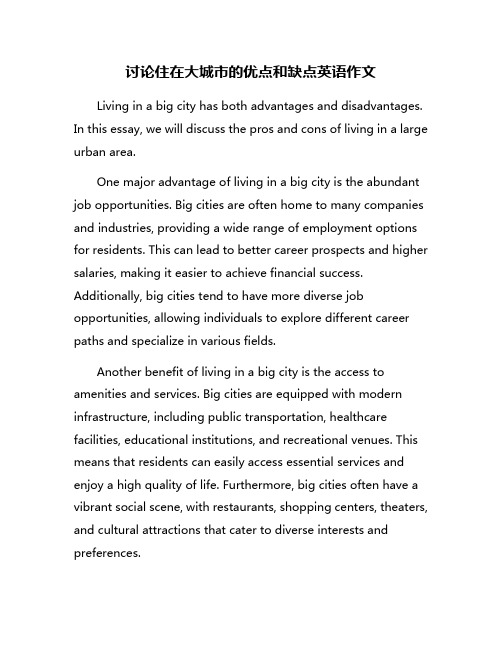
讨论住在大城市的优点和缺点英语作文Living in a big city has both advantages and disadvantages. In this essay, we will discuss the pros and cons of living in a large urban area.One major advantage of living in a big city is the abundant job opportunities. Big cities are often home to many companies and industries, providing a wide range of employment options for residents. This can lead to better career prospects and higher salaries, making it easier to achieve financial success. Additionally, big cities tend to have more diverse job opportunities, allowing individuals to explore different career paths and specialize in various fields.Another benefit of living in a big city is the access to amenities and services. Big cities are equipped with modern infrastructure, including public transportation, healthcare facilities, educational institutions, and recreational venues. This means that residents can easily access essential services and enjoy a high quality of life. Furthermore, big cities often have a vibrant social scene, with restaurants, shopping centers, theaters, and cultural attractions that cater to diverse interests and preferences.Moreover, big cities are melting pots of culture and diversity. People from different backgrounds and cultures come together in urban areas, creating a rich tapestry of customs, traditions, and perspectives. This cultural diversity enhances the social fabric of big cities, encouraging tolerance, acceptance, and mutual understanding among residents. As a result, living in a big city can be a rewarding and enriching experience, exposing individuals to new ideas, beliefs, and experiences.On the other hand, there are also drawbacks to living in a big city. One of the main disadvantages is the high cost of living. Big cities tend to have expensive housing, food, transportation, and other daily expenses, making it challenging for some residents to afford a comfortable lifestyle. This can lead to financial stress, debt, and a lower standard of living for individuals and families.Another disadvantage of living in a big city is the overcrowding and congestion. Big cities are often densely populated, leading to traffic congestion, pollution, noise, and overcrowded public spaces. This can have a negative impact on residents' physical and mental health, as well as their overall well-being. Additionally, the fast-paced lifestyle of big cities can be stressful and overwhelming for some people, leading to burnout, anxiety, and depression.In conclusion, living in a big city has its advantages and disadvantages. While big cities offer job opportunities, amenities, diversity, and cultural experiences, they also come with high costs, congestion, and stress. Ultimately, whether living in a big city is a positive or negative experience depends on individual preferences, priorities, and circumstances. It is important for individuals to weigh the pros and cons of big city living and make an informed decision based on their needs and aspirations.。
在大城市生活的优点和缺点英语作文
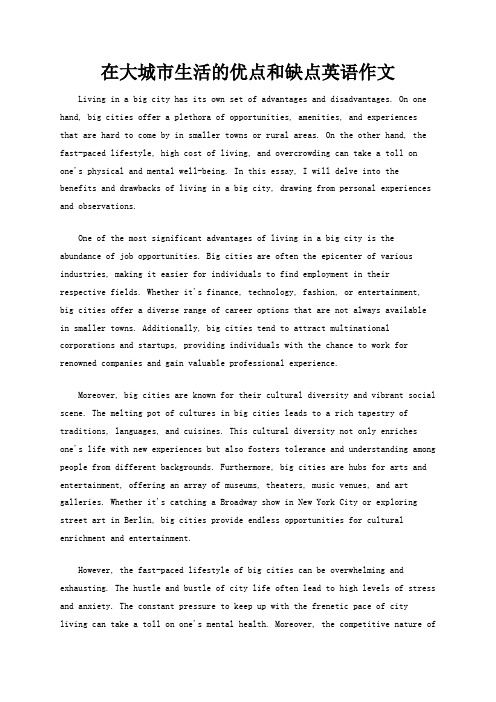
在大城市生活的优点和缺点英语作文Living in a big city has its own set of advantages and disadvantages. On one hand, big cities offer a plethora of opportunities, amenities, and experiencesthat are hard to come by in smaller towns or rural areas. On the other hand, the fast-paced lifestyle, high cost of living, and overcrowding can take a toll onone's physical and mental well-being. In this essay, I will delve into thebenefits and drawbacks of living in a big city, drawing from personal experiences and observations.One of the most significant advantages of living in a big city is the abundance of job opportunities. Big cities are often the epicenter of various industries, making it easier for individuals to find employment in their respective fields. Whether it's finance, technology, fashion, or entertainment, big cities offer a diverse range of career options that are not always available in smaller towns. Additionally, big cities tend to attract multinational corporations and startups, providing individuals with the chance to work for renowned companies and gain valuable professional experience.Moreover, big cities are known for their cultural diversity and vibrant social scene. The melting pot of cultures in big cities leads to a rich tapestry of traditions, languages, and cuisines. This cultural diversity not only enrichesone's life with new experiences but also fosters tolerance and understanding among people from different backgrounds. Furthermore, big cities are hubs for arts and entertainment, offering an array of museums, theaters, music venues, and art galleries. Whether it's catching a Broadway show in New York City or exploring street art in Berlin, big cities provide endless opportunities for cultural enrichment and entertainment.However, the fast-paced lifestyle of big cities can be overwhelming and exhausting. The hustle and bustle of city life often lead to high levels of stress and anxiety. The constant pressure to keep up with the frenetic pace of cityliving can take a toll on one's mental health. Moreover, the competitive nature ofbig cities can breed a sense of isolation and detachment, making it challenging to form genuine connections with others. The anonymity of city life can lead to feelings of loneliness and alienation, especially for those who are new to thecity or have a small social circle.Another downside of living in a big city is the exorbitant cost of living. From steep rents to inflated prices for everyday necessities, big cities can be financially burdensome. Affordable housing is often scarce, forcing many residents to live in cramped quarters or endure long commutes from more affordable areas. The high cost of living also extends to healthcare, transportation, and childcare, making it difficult for individuals and families to make ends meet. As a result, many people in big cities struggle to achieve financial stability and may face hardships in saving for the future.Furthermore, the overcrowding and congestion in big cities can be a major source of frustration. Traffic jams, packed public transportation, and long lines are commonplace in big cities, leading to a significant amount of time wasted on commuting and running errands. The sheer volume of people in big cities can also lead to noise pollution and a lack of personal space. Finding moments of peace and solitude in a city teeming with activity and noise can be a challenge, impacting one's overall quality of life.In conclusion, living in a big city comes with a multitude of advantages and disadvantages. While big cities offer unparalleled opportunities for career advancement, cultural enrichment, and social experiences, they also present challenges such as stress, high living costs, and overcrowding. Ultimately, whether the benefits of big city living outweigh the drawbacks depends on individual preferences and priorities. As someone who has experienced both the allure and the drawbacks of big city living, I can attest to the complex nature of this lifestyle. While big cities have much to offer, they also demand a great deal in return.。
高中英语作文讨论住在大城市的优点和缺点 5篇范文
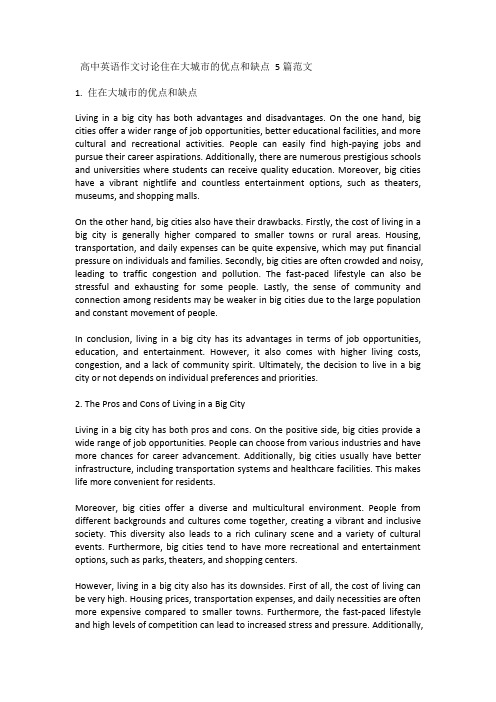
高中英语作文讨论住在大城市的优点和缺点5篇范文1. 住在大城市的优点和缺点Living in a big city has both advantages and disadvantages. On the one hand, big cities offer a wider range of job opportunities, better educational facilities, and more cultural and recreational activities. People can easily find high-paying jobs and pursue their career aspirations. Additionally, there are numerous prestigious schools and universities where students can receive quality education. Moreover, big cities have a vibrant nightlife and countless entertainment options, such as theaters, museums, and shopping malls.On the other hand, big cities also have their drawbacks. Firstly, the cost of living in a big city is generally higher compared to smaller towns or rural areas. Housing, transportation, and daily expenses can be quite expensive, which may put financial pressure on individuals and families. Secondly, big cities are often crowded and noisy, leading to traffic congestion and pollution. The fast-paced lifestyle can also be stressful and exhausting for some people. Lastly, the sense of community and connection among residents may be weaker in big cities due to the large population and constant movement of people.In conclusion, living in a big city has its advantages in terms of job opportunities, education, and entertainment. However, it also comes with higher living costs, congestion, and a lack of community spirit. Ultimately, the decision to live in a big city or not depends on individual preferences and priorities.2. The Pros and Cons of Living in a Big CityLiving in a big city has both pros and cons. On the positive side, big cities provide a wide range of job opportunities. People can choose from various industries and have more chances for career advancement. Additionally, big cities usually have better infrastructure, including transportation systems and healthcare facilities. This makes life more convenient for residents.Moreover, big cities offer a diverse and multicultural environment. People from different backgrounds and cultures come together, creating a vibrant and inclusive society. This diversity also leads to a rich culinary scene and a variety of cultural events. Furthermore, big cities tend to have more recreational and entertainment options, such as parks, theaters, and shopping centers.However, living in a big city also has its downsides. First of all, the cost of living can be very high. Housing prices, transportation expenses, and daily necessities are often more expensive compared to smaller towns. Furthermore, the fast-paced lifestyle and high levels of competition can lead to increased stress and pressure. Additionally,big cities are often crowded and noisy, which can be overwhelming for some individuals.In conclusion, living in a big city has its advantages in terms of job opportunities, convenience, and diversity. However, it also comes with higher living costs and a more hectic lifestyle. It is important for individuals to consider their own priorities and preferences when deciding whether to live in a big city or not.3. The Advantages and Disadvantages of Living in a Big CityLiving in a big city has both advantages and disadvantages. On the positive side, big cities offer a wide range of job opportunities. People can find employment in various industries and pursue their career goals. Moreover, big cities usually have better educational facilities, including prestigious schools and universities. This provides individuals with more options for quality education.Additionally, big cities have a vibrant cultural scene. There are numerous museums, art galleries, theaters, and music venues where people can appreciate and participate in various forms of art and entertainment. Furthermore, big cities often attract international events and exhibitions, which contribute to the diversity and richness of the cultural experience.However, there are also drawbacks to living in a big city. One major disadvantage is the high cost of living. Housing, transportation, and daily expenses can be significantly more expensive compared to smaller towns or rural areas. This can put financial strain on individuals and families. Furthermore, big cities are often crowded and noisy, with traffic congestion being a common issue. The fast-paced lifestyle and constant hustle and bustle can also be overwhelming for some people.In conclusion, living in a big city has its advantages in terms of job opportunities, education, and cultural experiences. However, it also comes with higher living costs and a more hectic environment. Individuals should carefully weigh the pros and cons before deciding whether to live in a big city.4. The Pros and Cons of Residing in a MetropolisLiving in a metropolis has both advantages and disadvantages. On the positive side, big cities offer a wide range of job opportunities. People can find employment in various industries and have more chances for career growth. Additionally, big cities usually have better infrastructure, such as transportation systems and healthcare facilities, which enhances the quality of life for residents.Moreover, big cities provide access to a diverse and multicultural environment. People from different backgrounds and cultures come together, creating a vibrantand inclusive society. This diversity also translates into a rich and varied culinary scene, as well as a plethora of cultural events and festivals. Furthermore, big cities often have a wide array of recreational and entertainment options, such as parks, theaters, shopping malls, and sports facilities.However, living in a metropolis also has its downsides. Firstly, the cost of living is generally higher compared to smaller towns or rural areas. Housing prices, transportation expenses, and daily necessities can be significantly more expensive, which can put financial strain on individuals and families. Secondly, big cities are often crowded and congested, leading to traffic jams and pollution. The fast-paced lifestyle and high levels of competition can also contribute to increased stress and pressure.In conclusion, living in a metropolis offers advantages in terms of job opportunities, convenience, diversity, and entertainment options. However, it also comes with higher living costs and a more hectic and crowded environment. Individuals should carefully consider their own priorities and preferences when deciding whether to reside in a big city or not.5. The Benefits and Drawbacks of Living in a Big CityLiving in a big city has both benefits and drawbacks. On the positive side, big cities provide a wide range of job opportunities. People can choose from various industries and have more chances to pursue their desired careers. Moreover, big cities usually have better educational facilities, including prestigious schools and universities, which offer quality education to students.Furthermore, big cities offer a rich cultural experience. People can immerse themselves in diverse communities and enjoy a variety of cultural events, festivals, and cuisines. In addition, big cities often have a thriving arts and entertainment scene, with numerous theaters, museums, and music venues.However, there are also downsides to living in a big city. Firstly, the cost of living is generally higher compared to smaller towns or rural areas. Housing, transportation, and daily expenses can be more expensive, which can strain one's budget. Secondly, big cities are often crowded and congested, leading to traffic congestion and pollution. The fast-paced lifestyle can also be overwhelming and stressful for some individuals.In conclusion, living in a big city offers advantages in terms of job opportunities, education, and cultural experiences. However, it also comes with higher living costs and a more crowded and hectic environment. It is important for individuals to carefully consider their own priorities and preferences before deciding whether to live in a big city or not.。
大城市的优缺点英语作文
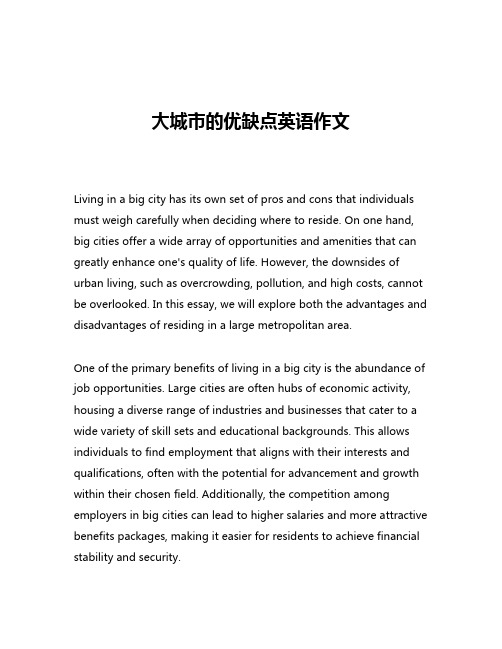
大城市的优缺点英语作文Living in a big city has its own set of pros and cons that individuals must weigh carefully when deciding where to reside. On one hand, big cities offer a wide array of opportunities and amenities that can greatly enhance one's quality of life. However, the downsides of urban living, such as overcrowding, pollution, and high costs, cannot be overlooked. In this essay, we will explore both the advantages and disadvantages of residing in a large metropolitan area.One of the primary benefits of living in a big city is the abundance of job opportunities. Large cities are often hubs of economic activity, housing a diverse range of industries and businesses that cater to a wide variety of skill sets and educational backgrounds. This allows individuals to find employment that aligns with their interests and qualifications, often with the potential for advancement and growth within their chosen field. Additionally, the competition among employers in big cities can lead to higher salaries and more attractive benefits packages, making it easier for residents to achieve financial stability and security.Another advantage of urban living is the access to a wide range of amenities and services. Big cities typically offer a vast array of entertainment options, from theaters and concert halls to museums and art galleries. Residents can enjoy a vibrant cultural scene, with a diverse selection of restaurants, bars, and nightlife to choose from. Furthermore, big cities often have well-developed transportation systems, including public transit, bike-sharing programs, and efficient road networks, making it easier for residents to navigate the city and access the resources they need.Moreover, living in a big city can provide individuals with a sense of anonymity and freedom. In a large metropolitan area, people can often blend into the crowd and enjoy a level of privacy that may be more difficult to achieve in smaller communities. This can be particularly appealing for those seeking to explore new experiences and express their individuality without the same level of social scrutiny.However, the advantages of big city living are not without their drawbacks. One of the most significant challenges is the issue of overcrowding. With a large population concentrated in a relatively small geographic area, big cities can become congested and overcrowded, leading to long commute times, limited living space, and a general sense of being overwhelmed by the sheer number of people. This can contribute to feelings of stress and anxiety, as wellas a decreased sense of community and connection among residents.Another major downside of living in a big city is the problem of pollution. The high levels of traffic, industrial activity, and energy consumption in large metropolitan areas can result in poor air quality, water contamination, and excessive noise pollution. These environmental issues can have detrimental effects on the health and well-being of residents, leading to respiratory problems, increased risk of certain illnesses, and a general reduction in quality of life.Furthermore, the cost of living in a big city can be significantly higher than in smaller towns or rural areas. Housing prices, utility costs, and the price of goods and services tend to be more expensive in urban centers, making it challenging for individuals, especially those with lower incomes, to afford a comfortable standard of living. This can lead to financial strain and the need to make difficult trade-offs in terms of housing, transportation, and other essential expenses.Additionally, the fast-paced and highly competitive nature of big city life can be emotionally and mentally taxing for some individuals. The constant pressure to keep up with the demands of work, social obligations, and the perceived need to maintain a certain lifestyle can contribute to feelings of stress, burnout, and a lack of work-life balance. This can have a detrimental impact on an individual's overall well-being and quality of life.In conclusion, the decision to live in a big city is a complex one that requires careful consideration of both the advantages and disadvantages. While big cities offer a wealth of opportunities, amenities, and a sense of anonymity, they also come with the challenges of overcrowding, pollution, high costs, and the potential for emotional and mental strain. Ultimately, the choice to reside in a large metropolitan area will depend on an individual's personal preferences, priorities, and ability to navigate the unique challenges and benefits of urban living.。
在大城市的利与弊英语作文
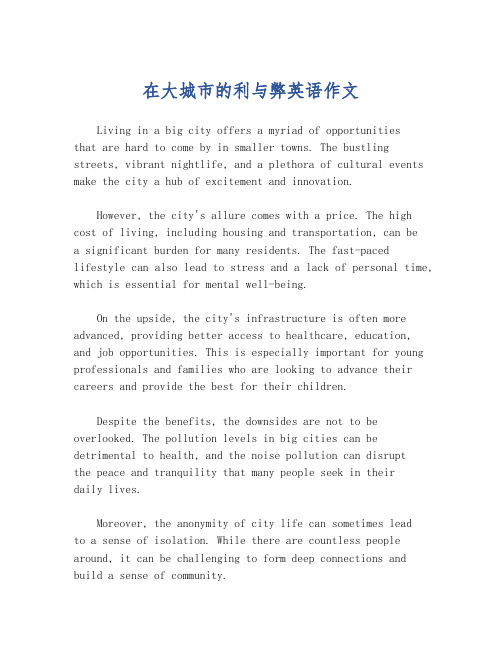
在大城市的利与弊英语作文Living in a big city offers a myriad of opportunitiesthat are hard to come by in smaller towns. The bustling streets, vibrant nightlife, and a plethora of cultural events make the city a hub of excitement and innovation.However, the city's allure comes with a price. The high cost of living, including housing and transportation, can bea significant burden for many residents. The fast-pacedlifestyle can also lead to stress and a lack of personal time, which is essential for mental well-being.On the upside, the city's infrastructure is often more advanced, providing better access to healthcare, education, and job opportunities. This is especially important for young professionals and families who are looking to advance their careers and provide the best for their children.Despite the benefits, the downsides are not to be overlooked. The pollution levels in big cities can be detrimental to health, and the noise pollution can disruptthe peace and tranquility that many people seek in theirdaily lives.Moreover, the anonymity of city life can sometimes leadto a sense of isolation. While there are countless people around, it can be challenging to form deep connections and build a sense of community.In conclusion, while the city offers a wealth of opportunities and resources, it is essential to weigh the pros and cons carefully. The decision to live in a big city should be based on personal priorities and the ability to adapt to its unique challenges.。
英语作文 住在大城市的优缺点
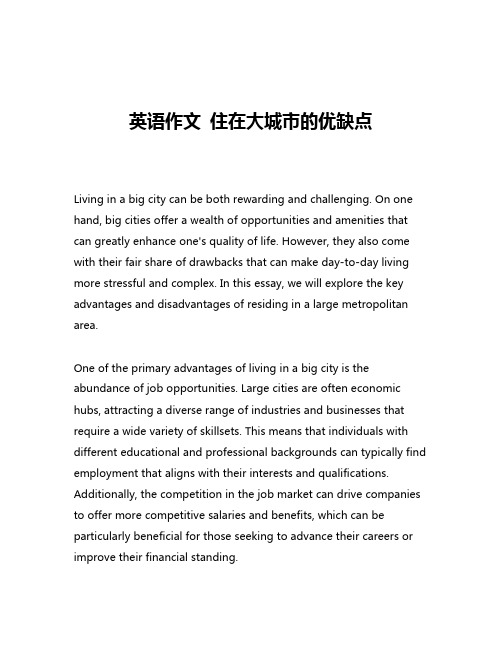
英语作文住在大城市的优缺点Living in a big city can be both rewarding and challenging. On one hand, big cities offer a wealth of opportunities and amenities that can greatly enhance one's quality of life. However, they also come with their fair share of drawbacks that can make day-to-day living more stressful and complex. In this essay, we will explore the key advantages and disadvantages of residing in a large metropolitan area.One of the primary advantages of living in a big city is the abundance of job opportunities. Large cities are often economic hubs, attracting a diverse range of industries and businesses that require a wide variety of skillsets. This means that individuals with different educational and professional backgrounds can typically find employment that aligns with their interests and qualifications. Additionally, the competition in the job market can drive companies to offer more competitive salaries and benefits, which can be particularly beneficial for those seeking to advance their careers or improve their financial standing.Another significant advantage of big city living is the access to a vast array of cultural and entertainment options. Large cities are often home to world-class museums, theaters, concert halls, and art galleries, providing residents with ample opportunities to engage with and appreciate various forms of art and culture. Moreover, big cities typically boast a vibrant and diverse culinary scene, with a wide range of restaurants, cafes, and specialty food establishments catering to diverse tastes and dietary preferences. This can be particularly appealing for individuals who value cultural enrichment and enjoy exploring new and exciting dining experiences.Furthermore, big cities often offer superior healthcare infrastructure, with access to state-of-the-art medical facilities, specialized healthcare providers, and a greater concentration of medical resources. This can be particularly beneficial for individuals with complex medical conditions or those seeking access to cutting-edge treatments and technologies. Additionally, the presence of multiple healthcare providers can foster competition, potentially leading to more affordable and accessible healthcare options for residents.Another advantage of living in a big city is the availability of diverse and efficient public transportation systems. Large metropolitan areas often have well-developed networks of buses, subways, trains, and other modes of public transit, which can provide residents with convenient and cost-effective ways to navigate the city and accessvarious destinations. This can be especially beneficial for individuals who do not own a car or prefer to minimize their reliance on personal vehicles, as it can reduce the financial burden and environmental impact associated with car ownership and usage.However, living in a big city also comes with its fair share of drawbacks. One of the most significant disadvantages is the high cost of living, particularly in terms of housing. Real estate prices in large cities tend to be significantly higher than in smaller towns or rural areas, making it challenging for many individuals, especially those with lower or middle-income levels, to afford comfortable and suitable living accommodations. This can lead to a greater financial strain and potentially limit the ability to save or invest in other areas of life.Another major drawback of big city living is the increased levels of traffic congestion and pollution. Large metropolitan areas often struggle with overwhelming vehicular traffic, which can result in lengthy commute times, increased stress, and higher levels of air and noise pollution. This can have adverse effects on both physical and mental health, as well as the overall quality of life for residents. The environmental impact of such congestion can also contribute to broader sustainability challenges faced by big cities.Furthermore, the high population density and fast-paced lifestyle ofbig cities can lead to a sense of anonymity and disconnection among residents. The sheer number of people living in close proximity can make it challenging to develop meaningful social connections and a sense of community, which can be particularly difficult for individuals who are new to the city or those who struggle with social anxiety or isolation. This can contribute to feelings of loneliness and a lack of social support, which can have negative consequences for mental well-being.Additionally, the increased competition and pressure to succeed in big cities can create a highly stressful and demanding environment. The constant pursuit of career advancement, financial stability, and personal achievement can lead to burnout, anxiety, and a diminished work-life balance. This can be particularly challenging for individuals who value a more relaxed and balanced lifestyle, or those who are seeking a greater sense of work-life integration.In conclusion, living in a big city presents both advantages and disadvantages that individuals must carefully consider. While large metropolitan areas offer a wealth of opportunities, resources, and amenities, they also come with the challenges of high costs, traffic congestion, pollution, and a potentially overwhelming and disconnected lifestyle. Ultimately, the decision to live in a big city will depend on an individual's personal preferences, priorities, and abilityto navigate the unique demands and trade-offs that come with such a living environment.。
在大城市生活的好处与坏处英语作文
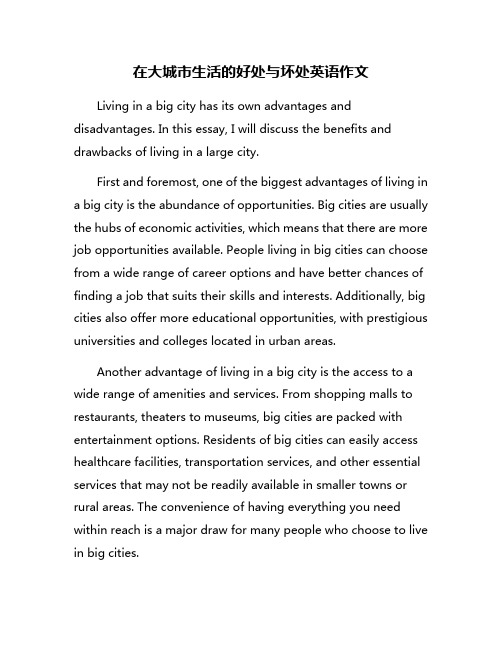
在大城市生活的好处与坏处英语作文Living in a big city has its own advantages and disadvantages. In this essay, I will discuss the benefits and drawbacks of living in a large city.First and foremost, one of the biggest advantages of living in a big city is the abundance of opportunities. Big cities are usually the hubs of economic activities, which means that there are more job opportunities available. People living in big cities can choose from a wide range of career options and have better chances of finding a job that suits their skills and interests. Additionally, big cities also offer more educational opportunities, with prestigious universities and colleges located in urban areas.Another advantage of living in a big city is the access to a wide range of amenities and services. From shopping malls to restaurants, theaters to museums, big cities are packed with entertainment options. Residents of big cities can easily access healthcare facilities, transportation services, and other essential services that may not be readily available in smaller towns or rural areas. The convenience of having everything you need within reach is a major draw for many people who choose to live in big cities.However, living in a big city also has its drawbacks. One of the biggest disadvantages of city living is the high cost of living. Housing prices in big cities are usually much higher than in smaller towns, making it difficult for some people to afford a decent living space. The cost of food, transportation, and other necessities is also generally higher in big cities, which can put a strain on the finances of residents.Another downside of living in a big city is the pollution and overcrowding. Big cities are often crowded with people and vehicles, leading to traffic congestion and air pollution. The noise and hustle and bustle of city life can be overwhelming for some people, especially those who prefer a quieter and more peaceful environment. Additionally, the crime rate in big cities is usually higher than in smaller towns, which can be a concern for safety-conscious individuals.In conclusion, living in a big city has its pros and cons. While big cities offer a wealth of opportunities and amenities, they also come with high costs, pollution, and overcrowding. Ultimately, whether living in a big city is beneficial or not depends on individual preferences and priorities. Some people thrive in the fast-paced and dynamic environment of big cities, while others may find it too stressful and expensive.。
- 1、下载文档前请自行甄别文档内容的完整性,平台不提供额外的编辑、内容补充、找答案等附加服务。
- 2、"仅部分预览"的文档,不可在线预览部分如存在完整性等问题,可反馈申请退款(可完整预览的文档不适用该条件!)。
- 3、如文档侵犯您的权益,请联系客服反馈,我们会尽快为您处理(人工客服工作时间:9:00-18:30)。
In many cities today, most people live in large apartment blocks. Does this kind of accommodation have more advantages or disadvantages?
范文1
Indeed, the modern tendencies show the clear picture that a huge amount of people prefer to live in apartment building and, obviously, it has own pros and cons for the citizens. In this essay , I will try to show my extended view to this statement.
First of all, bying an apartment provides a valuable benefits to the owner, such as price for the flat, doubtless, the cost for the apartment block is a quite less cheaper in comparison to cottage house and hence people could gain a consierge, laundry and 24/7 monitoring facilities. Secondly, the apartments usualy located on the city territory and hereby gives a great opportunity for the citizens, fo instance, easy accessibility to the entertainments, transport services, educational buildings and etc. Obviously, this services arranging people’s life more comfortable.
However, living in large apartmnets block is flawed owing to several reasons. To begin with, not all of us are so lucky to live in a friendly apartment community. Some of neighbours could be totally noisy and it inevitably them to obey to house community’s rules in order to avoid nnpleasant consiquinces with neighbours. Morover, there is no doubt, that block apartmnets mostly located in urban area which regarded as having negative impact on environment caused by building materials, construction methods and etc.
To sum up, choosing living in large block apartmnets connected to people personality. During selection where to buy a house, people must take into their consideration the pros and cons of living in apartment and compare to current potential needs. It is the only way to make the right choice.
范文2
People make choices about the kind of accommodation they prefer to live in considering their budget, specific requirements and suitability. In the contemporary era, most people prefer large apartment complexes over isolated houses due to various reasons. A few others would go for a house rather than an apartment because of the increased privacy and more independence. However, I personally believe that advantages of living in an apartment visibly outweigh the disadvantages.
To begin with, one of the greatest benefits an apartment has to offer is convenience such as sports facilities, laundry facilities, pools and security around the clock. All these amenities are available at very reasonable and economical packages to the residents of these building blocks. Apart from the amenities and security aspects, the diversity of cultures is one of the joys apartment blocks are offering to their residents. Undoubtedly, living in a residential block has a great social aspect, the feeling of being a part of the community which might enable people to develop life-long connections. The crime statistics from 2016 revealed the fact that those who had been living in
building complexes are much safer than those who opt for isolated accommodations or houses.
On the opposite side, there are some visible downsides of living in an apartment. First and foremost, due to crowded nature of apartment buildings, the privacy offered by apartment complexes is less than of living in isolated accommodations. Furthermore, most of the apartments have premium parking, pet restrictions and no availability of gardening opportunities.
Last but not the least, the serious concern of affordable housing in cities is unavoidable, thus by having larger apartment blocks, there are increased opportunities for everyone to get an accommodation in cities at affordable prices. Therefore, huge apartment complexes are economical, safe, convenient and more practical than houses。
